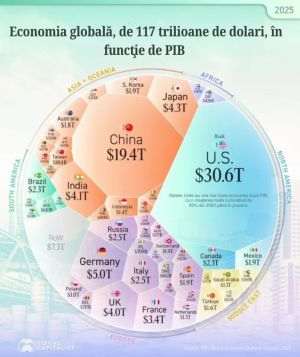
A Canadian recently stopped by the bank where he took out a 25-year mortgage to check his repayment status, given that interest rates have been rising rapidly lately, amid the increase in the monetary policy rate. To his surprise, next to the repayment period was the mathematical symbol for infinity.
How is such a thing possible? It is, because the mortgage loan contracted was of the "variable interest, fixed rate" type, a "financial engineering" elaborated with the stated purpose of maintaining the debt burden constant in the conditions of increasing interest rates. Under these conditions, the number of mortgage loans with maturities of 60, 70 or 90 years has embarked on a sustained growth trajectory at the level of banks that offer loans of the "variable interest, fixed rate" type.
As the Toronto Star writes, the Canadian obtained a 25-year loan with variable interest, with a term of 5 years until the next renewal or refinancing, and moved into the new apartment in February 2022. Then the interest required by the bank was 1.4%, while the reference interest rate for mortgage loans (prime rate) was 2.5%.
In the case of this type of mortgage, an increase in interest does not imply an increase in the monthly rate, which remains fixed, but increases the amortization period.
For the Canadian about whom the Toronto Star writes, the repayment period initially increased to 55 years, and then significantly exceeded this interval, which led to the appearance of the mathematical symbol for infinity on the amortization schedule.
His contract also includes so-called "trigger rate". When the monthly rate covers only the interest payment, the "trigger rate" is said to have been reached, and the principal and amortization period start to increase.
To avoid reaching this threshold, a borrower who bought his house during the pandemic had to pay the bank C$10,000. Another payment of C$10,000 to C$15,000 will soon follow, and the monthly payments will have to increase by C$500 in order to ensure the repayment of a reduced portion of the principal.
"His dream house turned into a nightmare, just as it turned into thousands of other homeowners who were told that interest rates would remain stable," writes the Toronto Star about the citizen who obtained the mortgage loan at only 1.4% a year and a half ago.
Now the interest they have to pay has more than quadrupled to 6.2%, while the benchmark interest rate recently reached 7.2%, a 22-year high (see chart 1).

Over the same 22-year period, Canada's residential mortgage loan balance increased 5-fold to C$2.1 trillion (see chart 2).

The average house price increased more than 3 times from 2005 to March 2022, then fell by more than 17% to January 2023, and is now in a new phase of growth (see chart 3), according to data from Canadian Real Estate Association (CREA).

Downward price pressures on Canada's housing market are likely to return soon, including forced sales by investors who borrowed at very low interest rates to purchase more rental apartments.
The Toronto-based publication also features other borrowers facing huge problems. One of them was forced to put his house up for sale, as the monthly rate increased from C$2,850 to C$6,200.
So far, the debtor has not used the social services offered by the food banks. More and more information has begun to appear in the Canadian press that even families earning around $100,000 a year have begun to get supplies from food banks.
With interest rates accelerating, Canadian consumers are now faced with extremely difficult choices. Discretionary spending was the first to drop significantly, and in many cases borrowers are looking for second and even third jobs to supplement their income, according to the Toronto Star.
Credit card delinquencies and defaults have also started to rise, as has the number of people having to tap into their retirement savings.
In the annual financial risk assessment report, recently published by the institution that oversees financial institutions in Canada, the Office of the Superintendent of Financial Institutions (OSFI), the residential real estate market is placed first in the ranking of financial risks.
OSFI stated that it "actively evaluates the risks represented by variable interest and fixed rate mortgages", while "extending the repayment period does not represent a long-term solution for borrowers", because "extending the repayment period presents risks including greater persistence of outstanding loan balances and greater risks of loss for lenders".
Regarding the situations in which the maturity of the loan was extended up to 90 years, OSFI stated that the debtors will not pay their mortgages for such a period, under the conditions that the original maturity of the loan will be returned to when the contract is renewed.
"On renewal, borrowers must return to their original credit requirements," OSFI says, without specifying how borrowers could sustain much higher payments, generated by both interest and principal increases, in the absence of a miracle that to take interest rates to historical lows recorded not too long ago.
A recent report by the International Monetary Fund (IMF) shows that among the 38 advanced economies, Canada has the highest mortgage default risk, along with Australia, Norway and Sweden.
The most vulnerable economies to the risk of default on mortgage loans are those characterized by a high degree of household indebtedness and the large number of mortgage loans with variable interest rates, as the IMF also points out.
With interest rates showing no signs of stopping their rise anytime soon, regardless of central bank decisions, a severe "adjustment" of prices in residential real estate markets seems unstoppable.
And no one seems to know, again, what the contagion effect might be or what the effects would be on the stability of the banking systems.






















































